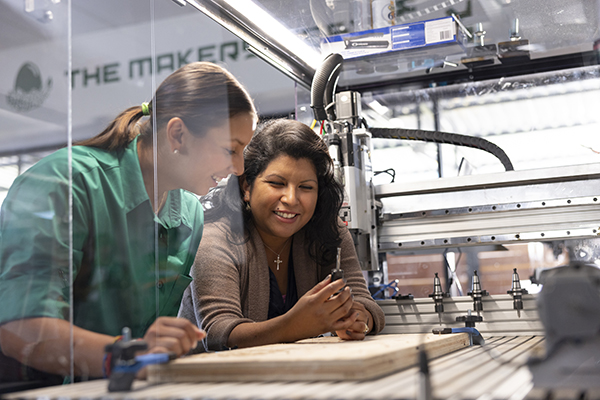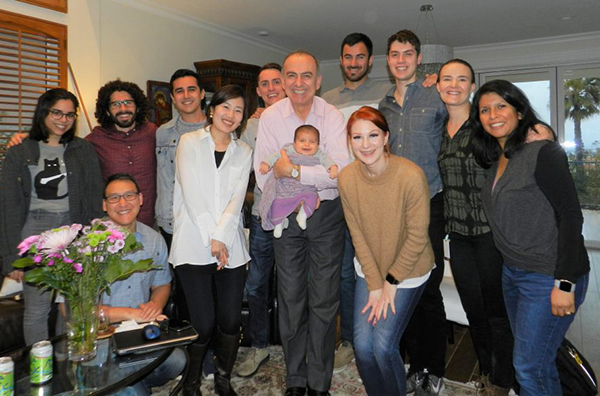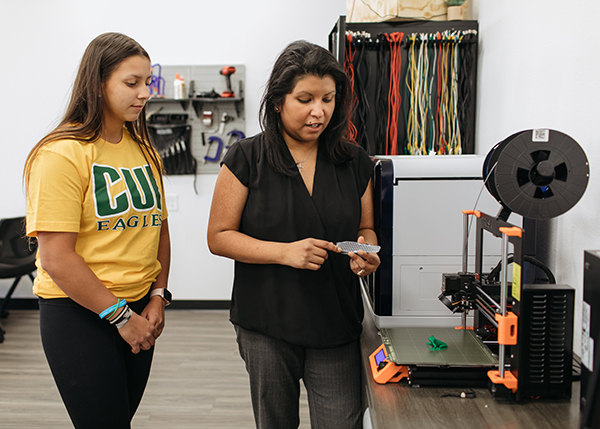Former UCI Postdoc Establishes Engineering Program at Concordia University
Feb. 21, 2024 – Gabriela Espinosa, a former postdoctoral researcher with the Samueli School, is the founding chair of the engineering program at Concordia University Irvine (CUI), a private nonprofit Lutheran university. Espinosa was selected to create the program in 2021 and currently serves as both the program director and an assistant professor.
Born in Nicaragua but spending most of her childhood in New York City, Espinosa formed an early passion for STEM. Neither of her parents worked in STEM fields, but they enabled her interests by taking her to local classes and outreach programs. She attended Yale University for a bachelor’s degree in applied physics and was a first-generation college student. After graduating, she married and moved to Missouri where she worked at St. Louis University in the Department of Biomedical Engineering running equipment in various labs.
“Back when I got my bachelor’s degree, I didn’t really know what an engineer was,” said Espinosa who now holds a master’s degree from St. Louis University and a doctorate from neighboring Washington University both in biomedical engineering. “I always tell students not to get caught up in the name of their degree because college is a journey in figuring out your interests and building something that reflects them.”
In 2018, Espinosa moved to California to be near family, and she interviewed to become a postdoctoral researcher at UCI with Distinguished Professor of biomedical engineering Kyriacos Athanasiou. Bringing her physics background to the lab, she was hired to research cartilage’s mechanical properties, which are subject to change with the onset of arthritis or with injury. Specifically, Espinosa focused on the characteristics necessary to make lab-grown biological tissues mimic real cartilage, including strength, elasticity and ability to produce smooth movement.
She enjoyed exploring a research area that impacts a large population and still uses the communication skills she exercised rigorously during her time at UCI when conveying information to her students now. Athanasiou believes that Espinosa has the qualities to excel in academia. He says her personality, emotional intelligence and communication style are extremely effective and complement her technical skills.
“As a faculty member, if you are lucky, once in a blue moon you identify a postdoctoral fellow or a student who, you are sure can change the world in a meaningful fashion,” said Athanasiou. “Dr. Gaby Espinosa is exactly that type of inspiring and intelligent person, and she is destined for greatness as both an administrator and a faculty member.”
In 2021, Espinosa’s team produced a publication on vibrometry testing of cartilage that enabled the lab to receive NIH funding for a Bio-Vibrometer. This machine allows nondestructive testing of the dynamic and viscoelastic properties of materials like tissues. It is available for UCI researchers to use through Athanasiou’s lab.
Her favorite memories from her time at UCI are from Athanasiou’s lab retreats and the connections she made with her fellow researchers.
“I have a picture of Dr. Athanasiou holding my 4-month-old baby while we were talking about science,” said Espinosa who is a mother of three. “A lot of postdocs are at a point in their lives when they’re thinking about starting a family, and he was always very supportive when I was pregnant and had the baby.”
Three years into her time at UCI, Espinosa started gaining interest from local employers. She settled on CUI and the opportunity to develop the university’s first engineering program. In the three years she’s been directing the program, she’s focused on ensuring that it offers a hands-on approach and emphasis on developing communication skills.
“I wanted things to be accessible for students early, and it was important to me that they actually build their designs,” said Espinosa whose teaching style focuses on building, application and cooperative design skills. “I get the first-year students familiar with the tools in our labs so that as they progress through the program, they’re always able to come back and make what they need.”
CUI now has about 40 engineering students including 15 freshmen and is growing each year. This May will mark the program’s first graduating class and eligibility to apply for ABET accreditation. The program will also be acquiring new equipment and hiring more faculty. Espinosa hopes to bring more diversity in skills to the program through collaborative events with UCI.
“I had a student join UCI’s electric racecar design team for a semester through independent study, and that experience eventually led her to an internship at NASA,” Espinosa said. “I think there’s a synergy between CUI and UCI’s engineering programs where we can get a lot out of the relationship because they are such different characters.”
– Lilith Christopher



